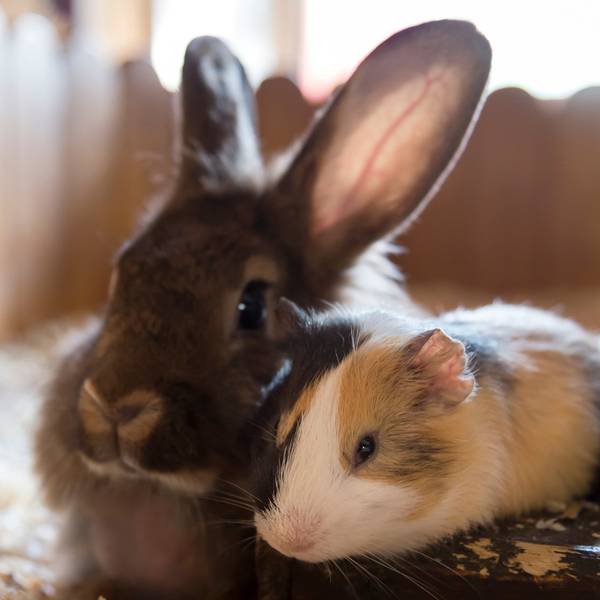Like humans, guinea pigs and bunnies both have a basic requirement for energy, protein, vitamins, minerals and water.
Although both species are herbivores-meaning they only eat plants-bunnies and guinea pigs require different nutrients, and different amount of these nutrients. Some commercial rabbit and guinea pig mixes do not meet the requirements of either species, and if you were to use them as the sole food source your pet could end up very ill.
So what is it about them that is so wrong?
There are a few things actually! Let's look at the animals basic nutrient requirements first.
Energy is needed to drive all the basic functions of the body. It is derived from carbohydrates and fats. Carbohydrates should be the main source of energy, in the form of starch and fibre. Both species should have at least 20% fibre in their diet, and preferably more. Fat is a source of energy that is also essential for absorption of fat soluble vitamins. Only a small amount of fat should be provided in the diet, around 2-3%. Too much fat (like too much carbohydrate) may lead to obesity.
Pellets are mainly a source of energy for your pet. Because they contain concentrated energy, your pet should only eat a small amount of good quality (as in, designed specifically for your species of pet) pellets.
Protein is an essential structural component of the body. It is used to make and repair cells, like those in muscles and organs. Rabbits require crude (general) protein levels of about 12-13 % of their diet, while guinea pigs need higher amounts, around 16 - 18%. If the diet has enough protein for a guinea pig, it has too much for a rabbit.
Vitamins and minerals are also required, but in much smaller amounts. Minerals include calcium, phosphorus, sodium, potassium, selenium and cobalt.
The single most important difference between feeding bunnies and guinea pigs is that like humans, guinea pigs are not able to make their own vitamin C. Rabbits, on the other hand, can make it. Guinea pigs must eat vitamin C every day so they don't suffer from a deficiency, also known as scurvy. The best way to prevent scurvy is to feed a cup of fresh vegetables, primarily leafy greens every day.
It is a good idea to offer your bunnies or guinea pigs fresh veggies every day.
This will provide them with the vitamins and minerals they regularly need. Bunnies should be offered around 2 packed cups of leafy greens per kg body weight each day. There should be a few different types included, to ensure that a wide range of nutrients are provided. Some examples to include; Asian greens, broccoli (including the stem and leaves), celery, endive, brussel sprouts, spinach, carrot tops, and herbs. Guinea pigs should also be offered these, and they can eat a similar volume to bunnies- even though they are often much smaller.
Probably the most important, and often neglected, nutrient that both species need is fibre. Soluble fibre is digested in the part of the digestive system called the caecum, while insoluble fibre forms the bulk of the droppings. Although it is not digested, this fibre is still really important as it helps to keep the intestines working.
So how do make sure your pocket pet is getting enough fibre?
Hay, hay and more hay!!! Hay is also fabulous because it helps to take care of their teeth (more about that later). Both guinea pigs and bunnies should be given unlimited access to hay, and you should aim for it to make up about 80% of their diet.
We grow a lot of fantastic oaten hay in Australia, and it is great for your bunny or piggie. Meadow, pasture and ryegrass hays are also fine. Basically, you just need to feed hay made out of grass, which is higher in fibre and less nutrient rich.
You should avoid feeding adult pets lucerne (also known as alfalfa) or clover hays. These are legumes, not grasses! Lucerne is only suitable for younger, growing animals, or lactating mums. It has a high calcium content which can cause urinary obstructions, kidney and bladder stones.
So what about feeding fruits?
Generally, both guinea pigs and rabbits love sweet foods and can be very greedy! Rabbits can easily become overweight or obese from eating too much fruit, which are high in sugar. Fruits are "treat foods" that should be given in limited quantities only (1-2 tablespoons per rabbit per day).
The other very important nutrient
That hasn't been mentioned yet is fresh water. Fresh water should always be available, in unlimited amounts. It should be changed everyday- you wouldn't like to drink water that had been sitting out for a week, so why would your pet!
Dental Checks are important for rabbits too!
Signs of dental disease in rabbits include nasal discharge, inability to close the mouth, facial swelling and protruding front teeth. They often stop eating and may start to suffer from anorexia.
If you have any concerns about your furry friend speak to your local Just For Pets store.
Things to Remember:
- Your pets diet should be mainly grass hay, supplemented with fresh leafy greens
- Fruits are treat foods
- Guinea pigs have a higher requirement for energy and protein and can therefore be given (relative to their size) more food
- Guinea pigs need fresh veggies every day to provide them with sufficient vitamin C
- NEVER feed seeds, cereal grains, fresh corn, beans or peas
- Always have fresh water available
- Always remember how much you love your pet, even when it's eating its own poo!






